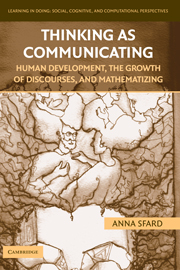Book contents
- Frontmatter
- Contents
- Series Foreword
- Introduction
- Acknowledgments
- Part I Discourse on Thinking
- Part II Mathematics as Discourse
- 5 Mathematics as a Form of Communication
- 6 Objects of Mathematical Discourse: What Mathematizing Is All About
- 7 Routines: How We Mathematize
- 8 Explorations, Deeds, and Rituals: What We Mathematize For
- 9 Looking Back and Ahead: Solving Old Quandaries and Facing New Ones
- Glossary of Commognition
- References
- Name Index
- Subject Index
- Titles in the series
6 - Objects of Mathematical Discourse: What Mathematizing Is All About
Published online by Cambridge University Press: 27 July 2009
- Frontmatter
- Contents
- Series Foreword
- Introduction
- Acknowledgments
- Part I Discourse on Thinking
- Part II Mathematics as Discourse
- 5 Mathematics as a Form of Communication
- 6 Objects of Mathematical Discourse: What Mathematizing Is All About
- 7 Routines: How We Mathematize
- 8 Explorations, Deeds, and Rituals: What We Mathematize For
- 9 Looking Back and Ahead: Solving Old Quandaries and Facing New Ones
- Glossary of Commognition
- References
- Name Index
- Subject Index
- Titles in the series
Summary
I close my eyes and see a flock of birds. The vision lasts a second, or perhaps less; I am not sure how many birds I saw. Was the number of birds definite or indefinite? The problem involves the existence of God. If God exists, the number is definite, because God knows how many birds I saw. If God does not exist, the number is indefinite, because no one can have counted. In this case I saw fewer than ten birds (let us say) and more than one, but did not see nine, eight, seven, six, five, four, three, or two birds. I saw a number between ten and one, which was not nine, eight, seven, six, five, etc. That integer – not-nine, not-eight, not-seven, not-six, not-five, etc. – is inconceivable. Ergo, God exists.
Luis Jorge BorgesI remember as a child, in fifth grade, coming to the amazing (to me) realization that the answer to 134 divided by 29 is 134/29 (and so forth). What a tremendous labor-saving device! To me, “134 divided by 29” meant a certain tedious chore, while 134/29 was an object with no implicit work. I went excitedly to my father to explain my discovery. He told me that of course this is so, a/b and a divided by b are just synonyms. To him, it was just a small variation in notation.
William ThurstonThe “content” of mathematics does not exist in the material world; it is created by the activity of mathematics itself and consists of ideal objects like numbers, square roots and triangles.
Michael A. K. Halliday- Type
- Chapter
- Information
- Thinking as CommunicatingHuman Development, the Growth of Discourses, and Mathematizing, pp. 163 - 194Publisher: Cambridge University PressPrint publication year: 2008

